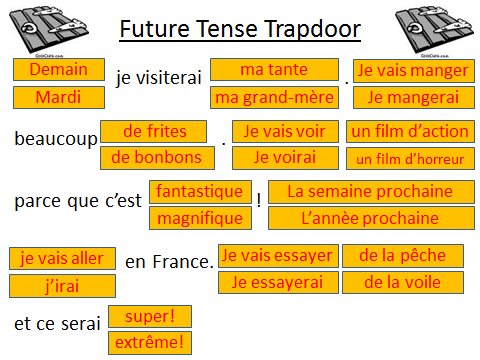Observations wait for no man. My last formal observation was the day after I lost Scout. Today's observation was following a no-sleep weekend after Nightrider. Which is why making sure your lessons rely heavily on student-led tasks is crucial.
Today I was observed with my challenging yet small year 9 group. To put the situation into perspective, we have Exam Week next week, with all year groups sitting end-of-year exams in most subjects. The week commencing June 30th sees the start of the new school year and our timetable rollover. So we are delivering a lot of revision lessons to our classes in KS3, and really pushing y9 French students to Levels 5 and 6.
So my lesson today looked like this:
The main purpose of the tasks today was to increase the confidence of students when they come across longer texts, as many of them still look at a Level 5/6 text and reverse away from it. (I find myself doing the same with very long emails, so I know how they feel!).
So the first couple of quick-fire tasks served to remind the students of the patterns and importance of "é" and "ai" in tenses, which we had spent some of last lesson really getting on top of.
The group is small, their team work is sometimes questionable, but two tasks they love are Cluedo and Trapdoor. So we were working on them when the observers arrived. (It is too late to spot the spelling mistake!!!!!!!)
Next up was the team work element of the lesson, to pull key info out of the given texts. I used question styles from the exam papers, so they are used to the style. It was also the chance to use my differentiation by colour.
Students were put into 3 groups, which had one student of each ability group (set by target level). The task was a running dictation, and each group had the same task sheet. On that task sheet was a differentiated task by colour.
Students had to work together and help each other. They were also encouraged to use their key-word sheets which they have been given to help revision. The texts were scattered around the room, and it was the most active they have been as a group in a running dictation. One of my "green" girls (target level 4a) was picking out key words left, right and centre, which was great to see.
So... the outcome of the observation?
Things I had to overcome in the lesson:
- I didn't have my full quota of students until 20minutes in, because of assembly over-running and some students being held back for a roasting over uniform. Which meant they arrived in a less then positive frame of mind
- One student was outside waiting to be removed by on call when the observers arrived
- Two (normally very reliable and focused) girls refused to take part in the whole class game of Cluedo, because of the two other teachers in the room.
The lesson was deemed to be Good. It wasn't awarded Outstanding because they couldn't work out how much progress was being made. We did a plenary at the end to recap the patterns, examples and time phrases for the past and future tenses. In retrospect I should have made it really clear (even clearer) how vital nailing the tenses are for levels 5 and 6.
So my question to you all is... How can you quantify/measure confidence and reinforcing to prove to non-specialist onlookers that the students can perform better at the end of the lesson than they could at the start?
I'll be darned if I know right now. I shall give myself time to ponder.
In the meantime, let us turn to Sophie.






Just goes to show that observation is at best a crock of excrement. And at worst, unprintable... What a fabulous lesson!
ReplyDeleteI really like the ideas, how does Cluedo work? Would you also share these resources? They are really great. Thanks!
ReplyDelete